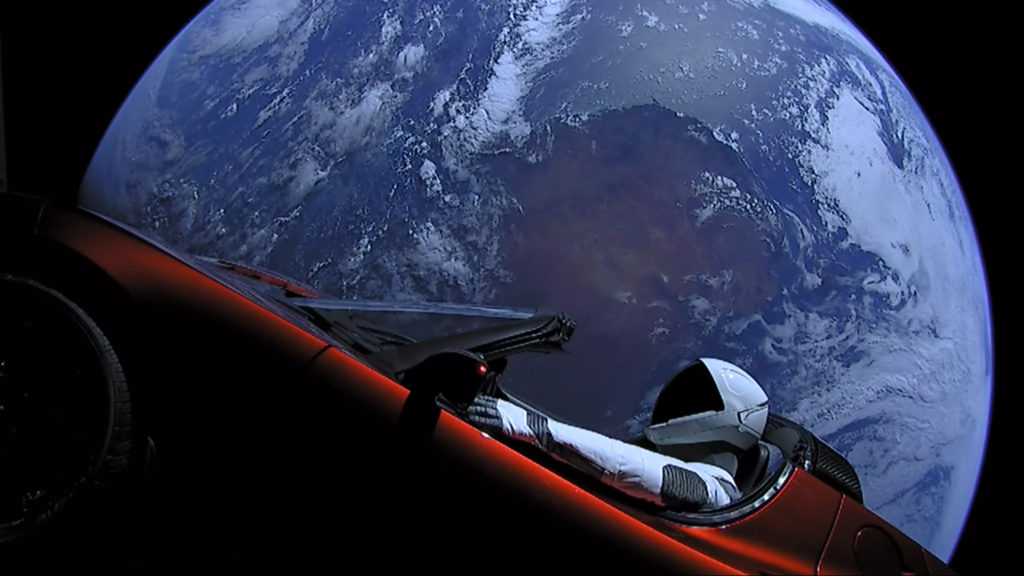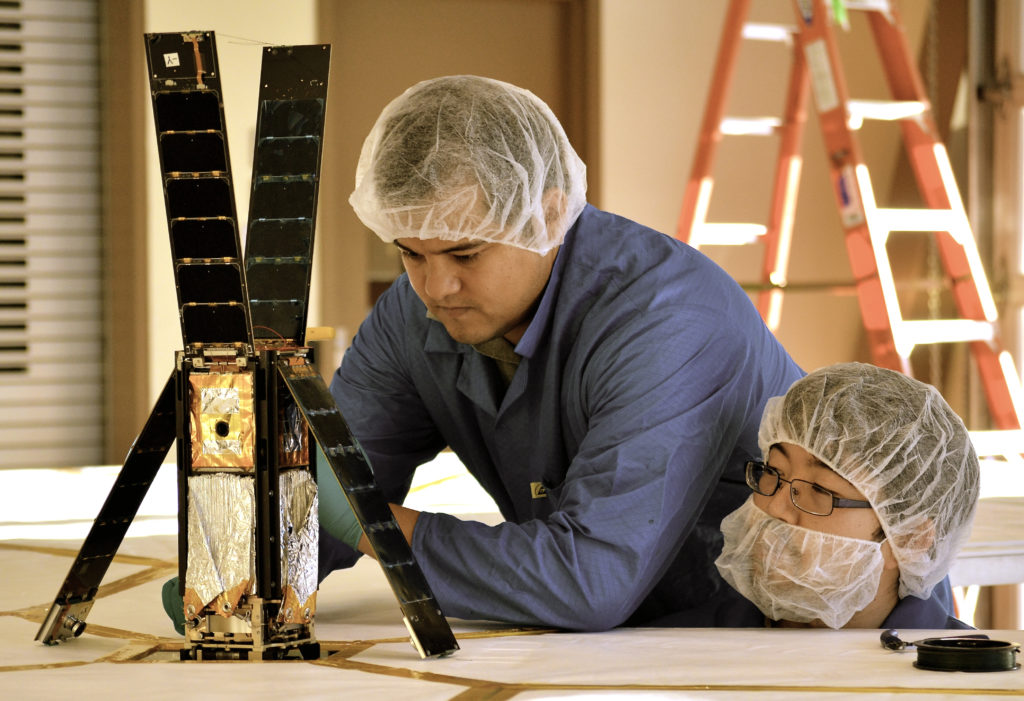‘Elon Musk is my God’, ‘My favourite human being’, ‘This guy is the future!’, ‘Find a way to make him immortal!’. Exclamations like these abound in the comment section under any Elon Musk related YouTube video. For a libertarian-billionaire CEO, Musk seems to have accrued a rather uncanny divine status. One need not discredit his indisputably astonishing technological developments to examine the foul implications of the almost cult-like adoration of his persona. Not only is any kind of mass idolatry undemocratic by virtue of the inherent imbalance of this kind of relationship. Because due to the high level of the stakes at play in the burgeoning private space industry, CEO worshiping culture carries especially dangerous implications for the future of research, development, and human progress as a whole.
A jaw-dropping achievement
A couple of weeks ago, SpaceX successfully launched its Falcon Heavy, the biggest and most powerful rocket ever made. Although the more significant achievement was that it managed to recuperate the rocket boosters, enabling their re-utilization and thus enormously reducing the cost of future space missions. The jewel in the crown of this operation however, was not the engineering milestone accomplished but Starman (named after Bowie’s hit song), a mannequin wearing a spacesuit at the wheel of Musk’s old Tesla car. The vehicle, along with its inanimate driver were launched into space and set to orbit around our planet. A firm redoubling of creativity which became viral quicker than a rocket.
Because if there is something that stands out more than Musk’s marvellous technological landmarks, it is his seemingly disinterested marketing stunts. Oxymoronic as it may sound to characterize a marketing campaign as disinterested, it is precisely from this incongruity that the company derives its worldwide popular enthusiastic appeal. Aside from the collateral publicity of Musk’s own car brand, Starman’s aim was not to directly promote any of SpaceX’s services since, by and large, its general addressees do not precisely fit the profile of a potential SpaceX customer; the price of a rocket launch oscillates around the millions! The real purpose of this whimsical move was to generate an asset infinitely more valuable than what money can buy: social capital.

SpaceX’s PR department is playing the crucial role of masking the real, private, competitive ambitions of a multi-billion enterprise behind the veil of sympathetic, trendy CEO driven by an aspiration to contribute to the benefit of humanity. A carefully crafted initiative to generate a legitimizing myth for the company. To be sure, SpaceX operating profit margins have been only recently switched from the loss domain to a barely positive net cash-flow, so SpaceX is running for the long haul. Consequently, to guarantee its future prosperity it must first acquire a respectable acceptance among the citizens whose governments (SpaceX’s actual clients) will provide the succulent moneybags in the form of public contracts for satellite launches.
To fend off against potential accusations labelling this outlook as yet another unwarranted cynical conspiracy theory, it suffices to point out that public sympathy is part and parcel of contemporary capitalism. Obsolete is the era of the lavish, portly, exploitative capitalist with a top-hat. Today more than ever, a company’s market success depends on its public allure. Because of the fast-paced rhythm of news circulation in the information era, even the most minimal corporate scandal can take a huge toll on a firm’s value overnight. The cancellation of popular TV series in the wake of the industry’s endemic sexual abuse allegations, Starbucks’ decision to hire thousands of refugees in Europe, or American industrial sectors cutting NRA ties after Florida Spring’s mass shooting, exemplify the increasing entrepreneurial tendency of portraying a more decent image by engaging in thoughtful practices.
Capitalism of façades
What the adoption of inclusive, sustainable, feminist, LGBT friendly, and other essential considerate attitudes demonstrate, is that social acceptance is becoming almost as relevant as profit margins. So how could we criticize these important developments? Of course, this new corporate ethos contributes to the dissemination of important social conquers which are the result of centuries of social struggle. So instead, the appropriate question should be, what took so long? We should not be fooled into believing that these decisions resulted from companies’ sudden humanitarian concerns. What these developments adumbrate, is the transition into a capitalism of pure semblances.
To be clear, capitalism with a human face is still capitalism: a system governed by the inexorable logic of profit maximization which can only thrive in a growing unequal society. Having recognized the considerable positive effect these new affable gestures have on the public, we should not forget that prior to any social concern exists a firm’s commitment to its private stakeholders and investors. Even today, billions of dollars uphold dubious practices such as fracking, arms trade, or slash-and-burn agriculture, all of which have deleterious consequences for human lives. But it would be absurd to expect otherwise, since by definition, a company’s utmost priority is the wealth maximization of its associates. Within the capitalist framework, the private sector has never had the responsibility nor the obligation to deal with public problems. Collective problems are political, and as such they count with another institution specifically dedicated to their resolution; the State.
The State (executive, legislative, and judiciary branches) acts as the ultimate mediator of public conflicts. Despite its many flaws as the guarantor of justice, the laws enforced by the State represent the only viable means that the dispossessed can rely on as a defence against the powerful. Historically at least, thanks to the welfare state, the ‘have-nots’ who could not afford a private retirement fund, an expensive health care plan, or decent housing, could resort to public services that would ensure a minimum living condition (again, at least in theory). It was the state’s responsibility to mitigate inequalities by compensating the excesses or imbalances of the private sector. In great measure, society’s stability depended on the harmonious coexistence between the public and the private, but in the past decades the latter has been favoured by a growing deterioration of the former. Without getting down to the nitty-gritty of the neoliberal doctrine, it suffices to remember how the drive to privatization has systematically starved the NHS, state schools, pension schemes, the prison system, and critical infrastructure.
The trend of assigning tasks that were previously public to private agents is nothing new, but since space exploration was such an expensive industry it was generally only accessible to investments on behalf of state agencies. With the contemporary reduction of technological costs, the aerospace industry has become much more accessible, and hence susceptible to a creeping wave of liberalization. The common neoliberal justification exhorting private control in the name of competitiveness and progress (the same kind of logic many used to defend Trump, arguing that being a successful businessman makes him apt to ‘manage’ a country) is based on the fundamental flaw of equating technological development with human progress. Human progress is necessarily social, and it can only be so if it is accountable to democratic institutions which prioritize the general interest. Musk’s progress is, first and foremost, his personal progress. A progress at the service of the interests of his conglomerate and his class, anti-communal, elitist and flat out dangerous.
A not so hip CEO
To begin with, the apparently innocuous Starman is a rather dirty specimen. Scientists have accused SpaceX of ignoring the common practice among government space agencies of sterilizing everything that goes into space due to the risk of potentially contaminating other planets with earthly microbes, which would hamper extra-terrestrial research. At an average cost of 7,000£ per pound to launch a payload into orbit, others have also questioned the scientific value of using resources to send mere eye candy when more useful initiatives could have been adopted. NASA’s educational CubeSat program for example, provides opportunities for universities, elementary schools, and non-profit organizations to send actually functional satellites instead.

Moreover, as a private company SpaceX had no obligation to share its mission records or any kind of information that would contribute to collective space progress. There is also scepticism on whether Musk is abiding by the ‘Outer Space Treaty’, which was ratified in 1967 by all UN major powers to guarantee that ‘the exploration and use of outer space shall be carried out for the benefit and in the interest of all countries and shall be the province of all mankind’. The treaty also confronts Musk’s future plans of private Mars colonization.
There is also no lack of controversy in Musk’s other business ventures. Last year Tesla workers came under fire by workers who accused the company of allowing anti-LGBT culture, racial abuse, and pervasive harassment culture in the workplace. No surprise coming from a company whose insane ambition leads to workers ‘pass out, hit the floor like a pancake and smash their face open’, and to which ambulances have been called in to take away fainted workers. The incessant working culture forces laborers to take on 80-hour work weeks or risk losing their position. Last October Tesla dismissed hundreds of employees (concentrating on those involved in a pro-union initiative) after unsatisfactory performance reviews i.e. for working less than 12 hours per day.
The indignity of charity
We should not allow ourselves to be deceived by union-busting double-dealers, not only for the sake of social progress, but for the very health and dignity of SpaceX’s and Tesla’s employees. We should defend the importance of strategic planning, because despite the allure of CEO’s self-proclaimed concern for the general interest, there is no guarantee that they will deliver without the democratic constraints proper to state institutions. It would be dangerous to bestow upon multi-billionaires the responsibility of directing technological development, for they are driven more by personal impulses than by concern for what is common. There is absolutely no excuse, in fact, it would be insulting to look up and be thankful to these figures because what the dependency on charity announces, is the absence of justice. A more dignifying aspiration would be the adequate public financing of necessities by means of a progressive redistributive system that prioritizes the social requisites for human progress.
Machiavelli, a statesman par excellence, already warned us of the perils of artificial altruism. He said that we must be attentive to the modes in which citizens build their reputation —whether public or private— because many times ‘works that appear merciful, which cannot reasonably be condemned, become cruel and are very dangerous for a republic if they are not corrected in good time’ (Machiavelli, 1998, p. 276). Considering Musk’s preference for individualized forms of transport due to the fear that he might be traveling in a bus with a serial killer, it is not difficult to guess under which category Machiavelli would have put him. At the end of the day, Musk might just be a little bit too coward for a messiah…





